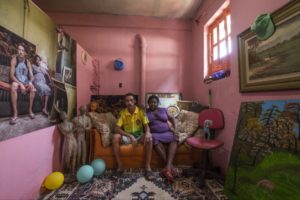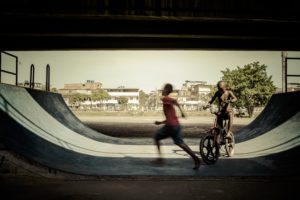Celebrating Brazilian Favelas

Maré from the Inside / Maré de Dentro is an interactive visual and textual exhibit developed through the collaboration of Brazilian and Global North-based artists, activists, and academics, including Dr Nicholas Barnes of the School of International Relations. Available in both English and Portuguese, it offers rarely captured views into the lives of residents in Complexo da Maré, a group of 16 contiguous favelas (informal and impoverished working-class neighborhoods) in Rio de Janeiro. Maré from the Inside is comprised of 30 family portraits, 26 street photographs, 4 interviews with select photographed families, and 3 documentary films. The exhibit demonstrates the diversity and creativity of the citizens of these communities while exposing the barriers favela residents confront in their everyday lives.
Cultural enclaves. Favelas are sites of vibrant artistic and cultural production, self-sufficiency, and collective mobilization. Favela artists and musicians are vital to broader cultural representations. They are at the heart, for instance, of Brazil’s famed Carnival and samba music—mixing African, European, and Indigenous religious and cultural expressions. Favela communities have also developed self-governing solutions to address the lack of both property rights and infrastructure.

Overcoming steroetyping. Mainstream representations largely continue to portray favelas as communities of destitution, vice, and criminality. This is a fallacy. Maré from the Inside challenges these long-standing and powerful stigmatizing narratives by capturing the diverse human, familial, and urban identities of the Maré community. The photographs, films, and interviews highlight the joy, creativity, and affection of Maré’s residents while suggesting the need for a fresh set of political and cultural strategies capable of breaking the cycles of exclusion and marginalization.
Re-democratization. Favelas were important players in the social movements that would bring an end to the military dictatorship (1964–1985) and launch Brazil’s re-democratization. Maré’s residents have also long been neglected by the city’s social and political institutions and, thus, much of life in the community is marked by inequality and inadequate infrastructure and social services. Much like other working class and Afro-descendent communities, Maré has also been subject to repressive policing practices since the community’s formation in the early 20th century. Favela residents remain targets of prejudice and discrimination, both in Brazil and internationally.
Learn more. A book about the exhibit has just been published by Virginia Tech Publishing. It is hoped that the exhibit will be available in St Andrews and other locations in Scotland in the near future.